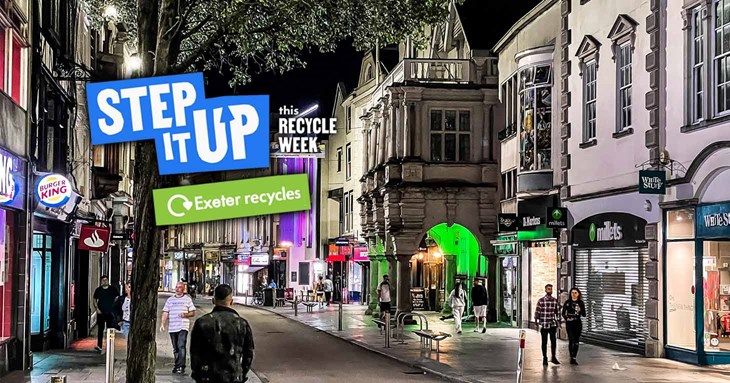Recycle Week Stepping It Up - Denis the Dustcart Blog
Published: 21 September 2021

In his regular feature, Denis the Dustcart talks about Recycle Week and how it’s his mission to help educate people about the importance of paying attention to their waste and recycling.
You can follow Denis on his Facebook page to keep up with information about Recycling issues.
Exeter’s Guildhall has been lit up green for Recycle Week – a symbol of our ongoing commitment to Step It Up in helping to take down the climate crisis.
According to research by Recycle Now, nine in ten people recycle.
Which means that ten in every hundred people don’t.
One hundred in every thousand people only use their rubbish bin.
I understand that there are certain circumstances that can make recycling more difficult – such as living in communal blocks or in residences with little or no storage capacity, or where there is a sensitive personal circumstance that influences the situation – but 10% is a significant proportion of the population.
Furthermore, according to the same research, 55% of households put items in the rubbish bin that could have been recycled – things such as shampoo bottles and bleach bottles.
Is this down to confusion? Mixed messages and a lack of clear labelling? The fact that recycling collections are different from one area to the next? Or just a lack of faith in the UK’s recycling industry?
It’s easy to see why some people would read a news reports about plastic being offloaded into landfill sites overseas and wonder, ‘Is it worth recycling, if this is what happens to my plastic?’
Such reports offer people a reason not to bother – people who are perhaps predisposed to not put the effort in. But they are also important in provoking the outrage necessary to bring about change, even if they only tell half the story.
The fact is, the failings highlighted by these reports are not caused primarily by the UK recycling industry’s inability to get hard-to-recycle plastics recycled, but by the production of this material in the first place.
That’s not to make excuses for anyone; sending stuff to be buried in other countries is by no means a reasonable solution, but we have to ask ourselves why there is so much ‘rubbish’ plastic being made at all.
If this was valuable material, it wouldn’t make economic sense for anyone along the chain to see it dumped. But it isn’t valuable. It’s worth less than zero to local authorities, who are managing tight budgets of public money.
It’s a local authority’s duty to spend public money appropriately. Sorting cheap, hard-to-recycle plastics and sending them off to be recycled would earn most councils a net loss.
Should it even be a Council’s responsibility to pay to have this horrendous material processed?
No, of course it shouldn’t.
Exeter is in a unique position, being able to utilise and develop in-house processes that offer solutions to some of the more problematic plastics without it costing the public, but this doesn’t mean we can get all plastics recycled.
Our primary sorting processes enable us to produce bales of pure polymer, which elevates the value of the material and attracts bidders from across the market. The purer the quality of the plastic, the greater the opportunity for it to be turned into useful, quality products again.
This allows us to pursue circular solutions where we can, such as getting our clear bottles turned back into clear bottles within the UK or having our bags recycled into sacks, again in the UK, for use in Exeter’s litter bins and sweeper barrows.
We are also able to sort fishing nets brought to us from around the region, and we’ve just installed a granulator that will enable us to process many of the more problematic materials on-site.
But our ability and desire to seek solutions for problem plastics does not distract us from the fact that we still need to focus most of our energy on capturing the more recyclable and therefore more valuable material.
And the fact is that some packaging – think salad bags, pet food pouches, cling-film, etc. – is just not an option, even for us. We have to send any we get to the Energy from Waste plant in Exeter.
The sheer volume of poor-quality plastic consumed in the UK is simply not sustainable.
Therefore, we must all Step It Up.
Local authorities must continue to improve their processes and to assist in educating their residents about what can be recycled and what it will become, and residents must ensure they are using their recycling bins correctly and are recycling everything they can, based on the information made available by their local authority.
It’s my mission to help educate people about the importance of paying attention to their waste: not only so they can understand better what can and can’t be recycled, but so they can scrutinise their consumer habits and get a clearer picture of how they can reduce their waste, their environmental and ecological footprints, and their impact on the climate.
It’s Exeter’s mission to push the boundaries of what is possible in local authority recycling processing. We will always seek circular solutions wherever we can and we will continue to expand our services and develop in-house processes that will allow us not only to recycle as much material as possible, but to ensure that as much of it as possible enters the circular economy.
See you on the journey.

